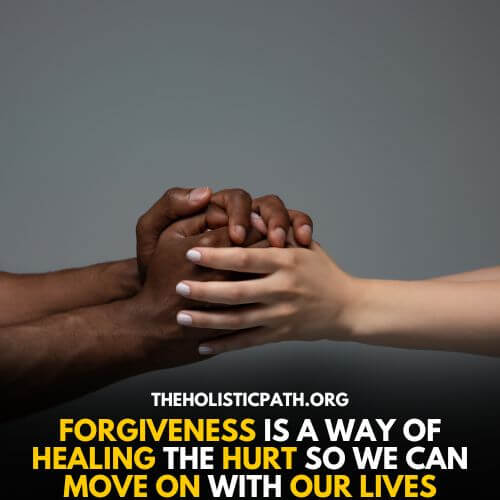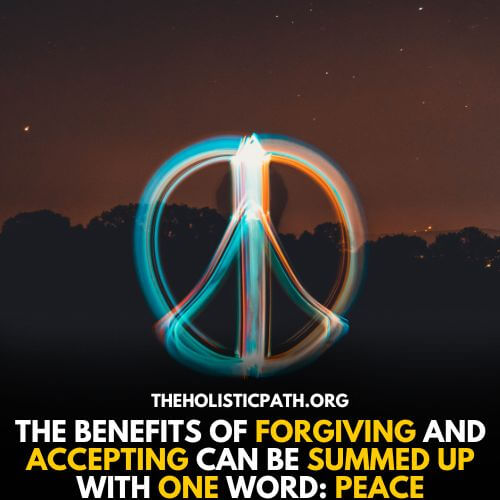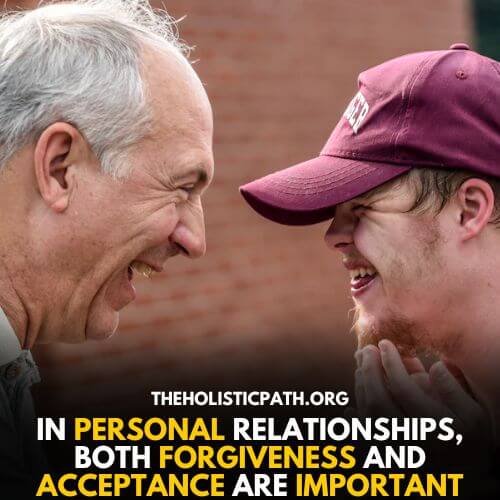Betrayal, hurt, and pain is all common experiences that humans face. How people usually react when they experience any of these is usually through forgiveness and acceptance.
There’s often a lot of confusion around the concepts of forgiveness and acceptance. Let’s start with forgiveness.
What Is Forgiveness And What Is Acceptance
There’s an oft-quoted saying that “to err is human, to forgive is divine.”
Forgiveness is seen as a virtue, something that we should aspire to. But what about acceptance? Is forgiveness always synonymous with acceptance?
Forgiveness is when we let go of the anger, resentment, and bitterness we feel towards someone who has hurt us. It doesn’t mean that what they did was okay, and it doesn’t mean that we need to have a relationship with them. Forgiveness is something we do for ourselves; it’s a way of healing the hurt so that we can move on with our lives.

Acceptance, on the other hand, is about accepting someone as they are, even if we don’t like everything about them. It’s about understanding that people are capable of making mistakes and that everyone is on their own journey. We can still love and care for someone even if we don’t condone their actions.
So, in a nutshell, forgiveness is about letting go of the negative feelings toward someone, while acceptance is about understanding and being compassionate towards them.
In many cases, forgiveness and acceptance go hand in hand. When someone wrongs us, we may initially feel anger and resentment. But if we can see past those emotions and forgive the person, we may also be able to find a place of acceptance.
Acceptance doesn’t mean that what happened was okay; it simply means recognizing that it happened and choosing not to dwell on it. In some cases, forgiveness may not be possible without first accepting what happened.
What Are The Benefits Of Forgiveness And Acceptance
The benefits of forgiving and accepting can be summed up with one word: peace.
When we forgive others, we free ourselves from the chains of resentment and bitterness that keep us locked in a state of anger and unhappiness. Forgiving someone doesn’t mean that we condone their behavior or that we have to be friends with them again – it just means that we choose to let go of the anger and hurt that we’re feeling.

Accepting yourself is equally important. It’s only when we accept our own flaws and mistakes that we can begin to make changes in our lives. When we’re hard on ourselves, it’s difficult to move forward and achieve our goals.
Accepting ourselves allows us to be kinder to ourselves, which in turn makes it easier to forgive ourselves for our shortcomings.
Here are 20 benefits of forgiveness and acceptance:
- Forgiveness and acceptance can help you let go of negative thoughts and emotions.
- They can help improve your mood and mental health.
- They allow you to focus on the present and the future instead of the past.
- They can help you maintain healthier relationships.
- They allow you to be more forgiving towards yourself.
- They can help you live a more positive and fulfilling life.
- They can help you feel more connected to others.
- They can help you overcome resentment and bitterness.
- They can make it easier for you to move on from difficult experiences or relationships.
- They can help reduce stress and anxiety levels.
- Forgiveness and acceptance promote healing in both mind and body.
- By forgiving, we free ourselves from the chains of anger, hatred, and resentment that keep us locked in a cycle of pain.
- When we accept our mistakes, we are able to learn from them and grow as individuals.
- Acceptance allows us to see things from a different perspective, which in turn helps us gain a new understanding.
- It is impossible to have peace of mind when harboring resentment or bitterness towards someone else.
- Forgiving someone does not condone their wrong actions, rather it sets you free from their control.
- It is possible to find compassion and understanding even towards those who have hurt us deeply.
- Acceptance opens up the door for positive change – both within ourselves and in our relationships with others.
- When we forgive, it sends out a message of hope that encourages others to do the same.
- Ultimately, forgiveness leads to peace – within ourselves as well as with those around us
Is One More Important Than The Other
There is no easy answer when it comes to forgiveness vs acceptance. Both have their own merits and importance. In some cases, one may be more important than the other, but it ultimately depends on the situation.
When it comes to personal relationships, both forgiveness and acceptance are important. Forgiveness is the act of releasing oneself from resentment or anger towards another person, while acceptance is the act of acknowledging that a situation has occurred and is no longer within one’s control.

Forgiveness is important because it allows you to move on from the past. Holding onto resentment or anger will only hurt you emotionally and can damage your relationship with the person you are angry with. It can also prevent you from forming new relationships.
Forgiveness allows you to see the situation from a different perspective and may even lead to a resolution or understanding between yourself and the other person. Forgiveness can be difficult, as it often requires taking the focus off of oneself and putting it onto the other person.
However, when done correctly, it can lead to a sense of peace and closure. For example, if your spouse has cheated on you, forgiving them does not mean that you have to stay with them or even continue to associate with them. It simply means that you are no longer holding onto the anger or resentment that may have been building up inside of you.
Acceptance is important because it allows you to build a relationship based on reality. When you accept someone for who they are, you are not expecting them to change. This can be liberating for both parties involved because it removes any pressure to change or be someone that you are not.
Acceptance also allows you to forgive someone for their shortcomings. Everyone makes mistakes and accepting them allows your relationship to be more forgiving and understanding.
Acceptance can also be difficult, as it often requires us to let go of our expectations and give up control over a situation. However, accepting a situation can provide relief and a sense of calmness, knowing that you are doing the best you can given the circumstances.
For example, if you are struggling with infertility, accepting that you may never have children can be difficult but ultimately allows you to move forward in your life in a more positive way.
When Is It Appropriate To Forgive And When Is It Appropriate To Accept
Forgiveness is appropriate in cases when the person who wronged you wants to make things right and/or when your own well-being requires it. For example, if the person who wronged you is truly sorry and wants to make amends, then forgiving them is likely the best course of action.
Additionally, if harboring resentment towards the person who wronged you is causing you emotional distress, then forgiving them may be the healthiest option for you.
Acceptance, on the other hand, is typically appropriate in cases when the person who wronged you does not want to make things right or is not sorry for what they did.
For example, if the person who wronged you continues to dismiss your feelings or denies that they did anything wrong. Then accepting that they are unwilling or unable to change may be the most sensible course of action.
Also, if you find that dwelling on the injustice done to you is preventing you from moving on with your life, acceptance may be a better choice than forgiveness.

Can We Forgive And Accept At The Same Time
Yes, we can forgive and accept at the same time. Forgiveness is about giving up our right to punish someone, while acceptance is about acknowledging that someone did something wrong and choosing to move on.
We can forgive someone even if we don’t accept what they did, and we can accept someone even if we don’t forgive them.
For example, imagine you were hurt by your friend’s betrayal. You might forgive them, but you still might not want to spend time with them. Or, imagine your parents divorced when you were young. You may have forgiven them, but you may still feel pain and sadness when you think about the divorce.
Is It Always Possible To Forgive Someone
Is it always possible to forgive someone? In theory, forgiveness is a virtuous act that can heal wounds and build bridges. But in reality (practice), forgiveness is often fraught with complexities and emotions.
There are many factors that can influence whether or not forgiveness is possible. This includes the severity of the offense, the relationship between the offender and the victim, and the presence of genuine remorse. Let’s take a closer look at each of these factors.
The severity of the offense is likely to be the biggest determining factor in whether forgiveness is possible. If someone has inflicted serious harm – physical or emotional – it may be incredibly difficult to find forgiveness in your heart.
However, even in cases of severe offenses, forgiveness may still be possible if the offender takes responsibility for their actions, expresses genuine remorse, and makes a sincere effort to change their behavior.
On the other hand, forgiveness may be more readily available for offenses that are minor or accidental in nature.
The relationship between the offender and the victim is also significant. If there is a close bond between them – such as familial ties or friendship – it may be easier to find forgiveness. Conversely, if there is little connection or no relationship at all, forgiveness may be less attainable.
The key here is willingness: even in cases where there isn’t a strong relationship, if both parties are willing to work towards forgiveness, it may still be possible.
Finally, forgiveness is more likely to be possible if the offender shows genuine remorse for their actions. If they take responsibility for their choices and express a desire to make things right, it can pave the way for forgiveness. Without remorse, on the other hand, it may be difficult to move forward.
Of course, there are many other factors that can contribute to whether or not forgiveness is possible – including one’s cultural background and personal beliefs.
Ultimately, it comes down to a decision made by the individual who was harmed. They must decide whether they are able or willing to forgive the person who hurt them. And only they can know what forgiveness looks like for them.
Can Accepting Someone’s Wrong-Doings Lead To Forgiveness
Acceptance is a funny thing. It’s not always easy to do, but when you finally manage to accept someone’s wrongdoings, it can be incredibly freeing. Forgiveness often follows acceptance, but not always.
You can accept that someone did something wrong without forgiving them for it. Forgiving them is letting go of the anger and hurt that their actions caused. It’s important to remember that forgiveness is a choice – you don’t have to do it if you’re not ready.

But if you are ready, forgiveness can lead to a sense of peace and understanding. It can also help to heal relationships that have been damaged by conflict. So if you’re struggling to forgive someone, try accepting their wrongdoings first. It might just be the first step on the road to forgiveness.
There are many different factors that can contribute to whether or not accepting someone’s wrongdoings leads to forgiveness. One example might be if the person who did something wrong sincerely apologizes and tries to make up for what they did.
Another example might be if the person who did something wrong is truly remorseful and is working on changing their behavior. If the person who did something wrong is not taking any responsibility for their actions, or if they are not making any effort to improve, then forgiveness may be less likely.
Ultimately, it depends on the individual and the situation as to whether or not accepting someone’s wrongdoings leads to forgiveness.
Forgiveness Can Be Harmful If It’s Not Genuine
When forgiveness is not genuine, it can actually do more harm than good. For example, if you are pretending to forgive someone in order to make them feel better, or to get them to do something for you, then that is not true forgiveness.
It can be harmful because the person who has hurt you might not realize that you are not really forgiving them, and they might not feel any better after hearing your words. In fact, they might even feel worse, because they know that you are not really forgiving them.
There’s no denying that forgiveness can be a powerful thing. It can help us to move on from the hurt of the past and create healthier relationships in the present.
However, forgiveness is not always a positive force. If it’s not genuine, forgiveness can actually do more harm than good. For example, if you forgive someone who hasn’t truly remorseful, you’re essentially giving them a free pass to hurt you again.
Similarly, if you forgive too easily, you may find yourself in relationships with people who take advantage of your kindness. In these cases, forgiveness can enable bad behavior and prevent us from setting healthy boundaries. Therefore, it’s important to be mindful of when forgiveness is appropriate and when it isn’t.
By doing so, we can ensure that forgiveness brings us closer to healing rather than furthering our hurt.
Acceptance Can Be Beneficial For Mental Health
Acceptance can be beneficial for mental health because it can help reduce stress and anxiety. When a person is able to accept what is happening in their life, they are less likely to feel overwhelmed by negative emotions. Acceptance can also help a person cope with difficult situations and experiences.

By accepting the reality of a situation, a person can focus on finding a solution rather than dwelling on the problem.
- Acceptance can help individuals to focus on their current situation rather than ruminating over past experiences or worrying about the future. This can lead to decreased levels of anxiety and depression.
- Acceptance can allow individuals to live more in the present moment, which can promote happiness and well-being.
- Acceptance can help individuals to manage difficult emotions and experiences, which can improve mental health overall.
How Do We Know When We Have Forgiven Someone
It can be difficult to know when you have forgiven someone, especially if the hurt was great. There are, however, some signs that forgiveness has occurred:
- You no longer think about the hurt or feel anger toward the person who caused it.
- You no longer want revenge.
- You are able to wish the person well.
- You have let go of negative feelings such as bitterness and resentment.
Of course, forgiveness does not happen overnight and you may still have some positive and negative feelings toward the person who hurt you. However, if you can say that you have forgiven them, it means that you have started on the road to healing.
What If The Person Who Hurt Us Doesn’t Want To Be Forgiven
There can be a lot of reasons why the person who hurt us doesn’t want to be forgiven. Maybe they don’t think they did anything wrong and therefore don’t see the need to apologize. Maybe they’re not sorry for what they did and don’t think that an apology is warranted. Or maybe they’re just not ready or willing to forgive themselves yet.
Whatever the reason, it can be difficult to deal with the hurt and anger we feel when the person who hurt us doesn’t want to be forgiven. We may feel like we’re being ignored or rejected, and it can be tough to move on from that.
There are a few things we can do to help deal with this situation:
- Firstly, we need to remember that it’s okay to feel angry and hurt. It’s natural to have those emotions after being hurt by someone else.
- Secondly, we should try and understand why the other person doesn’t want to be forgiven. What is their reasoning? Why do they think an apology isn’t necessary? Once we understand their perspective, it may be easier for us to accept their decision.
- Finally, we should focus on taking care of ourselves. This means doing things that make us happy and help us relax. This can include things like exercise, reading, spending time with friends, or simply taking some time for ourselves.
Conclusion
In the end, it is up to each individual to decide which path they will take. Forgiveness can be a difficult road to travel, but it can also be rewarding. acceptance may be easier in the short term, but it can lead to resentment and bitterness in the long run. The decision is up to you.
In the end, it is up to each individual to decide which path to forgiveness or acceptance is best for them. While some may find that forgiving those who have hurt them is the only way to move on and find peace within themselves.
Others may find that accepting the hurt and moving on without forgiving those who have wronged them is a more realistic option. Ultimately, the choice is up to each individual and there is no right or wrong answer. What matters most is that the individual finds what works best for them and sticks with it.
